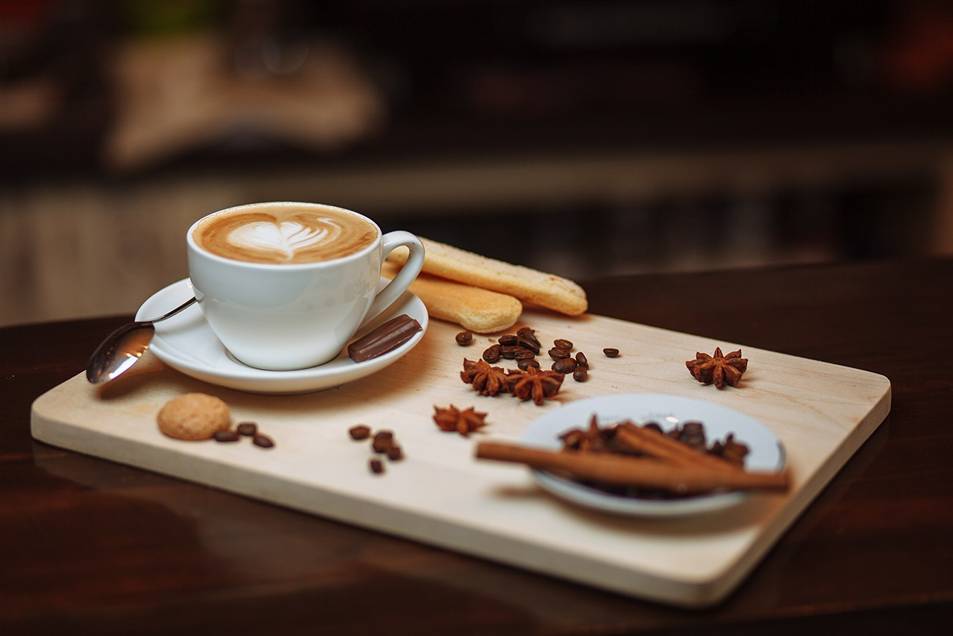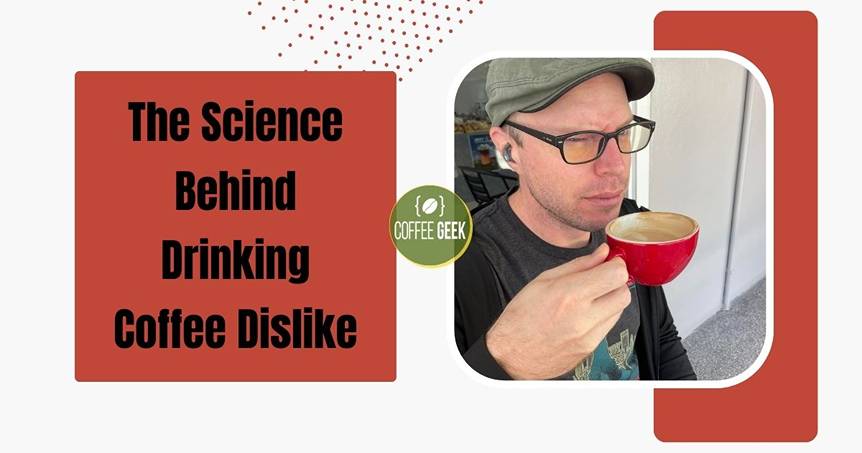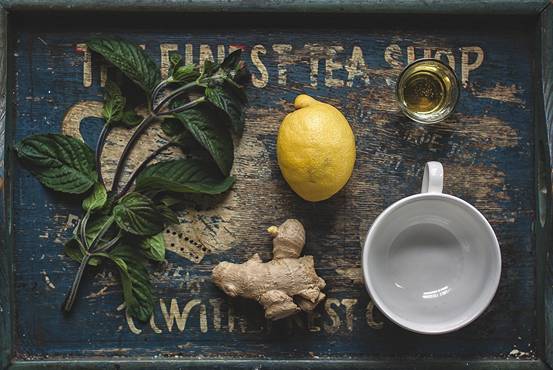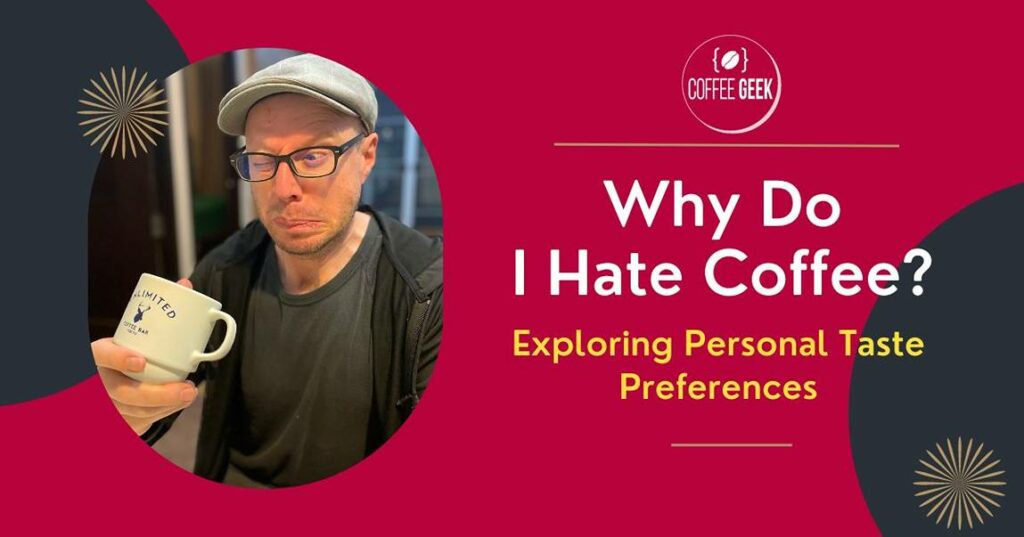Coffee is a beloved beverage for many people around the world, but some individuals find themselves disliking the bittjitter taste, smell, or even the experience of drinking coffee. Why do I hate coffee?
If you’re one of those who just doesn’t understand the hype surrounding this popular drink, rest assured, you’re not alone.
There are many reasons why some people might not enjoy coffee as much as others, and this article aims to explore those factors in detail.
Throughout this article, you will discover some of the scientific explanations that could be at play behind your disinterest in coffee, as well as how personal preferences, genetics, and lifestyle habits may contribute to your aversion.

As we delve into the world of coffee drinkers and non-drinkers alike, you’ll gain a better understanding of why coffee may not be your cup of tea.
Keep reading to uncover why you might not share the same love for coffee as countless others.
You will also learn about some potential alternatives that could still help you tap into the energy-boosting benefits of caffeine without having to force yourself to sip on a beverage you dislike.
The Science Behind Drinking Coffee Dislike
Genetic Factors
Your dislike of coffee might be related to your genes. Some people have genetically-based differences in how they process and taste coffee, which might make it seem more bitter flavors or unpalatable.
These genetic factors can play a significant role in your dislike of the beverage, as they shape how your body reacts to certain compounds found in coffee.

Caffeine Sensitivity
Another reason why you might dislike coffee is due to your sensitivity to caffeine. Caffeine is a natural stimulant present in cup of coffee, and some people are more sensitive to its effects than others.
If you fall into this category, you might experience symptoms like jitteriness or difficulty sleeping after consuming caffeine, which could deter you from enjoying coffee.
The attachment of caffeine to adenosine receptors in your brain is responsible for inducing wakefulness.
Taste Buds and Flavor Preferences
Your taste buds are essential in determining your preference for coffee.
Some people have more sensitive taste buds, which could lead to a heightened perception of the bitterness in coffee, contributing to a dislike for the beverage.
Taste preferences can also develop based on your cultural background, past experiences with food and drink, and even your age.
When it comes to your tongue, your taste buds play a vital role in detecting flavors, including the bitterness of coffee.
Many factors can influence how you perceive taste, and individual differences in taste buds and tongue structures can make certain flavors, such as the bitterness in coffee, more pronounced for some people.
Sensitivity to Acidity

Coffee can be acidic, which can be problematic for some people. If you have a sensitive stomach or acid reflux, the acidity in coffee may cause discomfort or digestive issues, leading to a dislike for it.
While there isn’t a one-size-fits-all answer for why you hate coffee, understanding these factors might help you make sense of your preferences.
Remember that personal preferences can vary greatly, and there’s no right or wrong when it comes to liking or disliking coffee.
It’s perfectly valid to have your own taste preferences and to enjoy other beverages that suit your palate better.
Cultural Aspects of Coffee Dislike – Why Do I Hate Coffee?
Upbringing and Environment
Your dislike for coffee might be rooted in your upbringing and environment. Perhaps you grew up in a household or region where coffee wasn’t a common beverage, influencing your personal taste.
People who are used to other morning beverages, like tea or traditional drinks, could feel repelled by the strong aroma and bitterness of black coffee.
It’s essential to recognize that personal tastes are heavily influenced by one’s upbringing and surroundings, and there is no absolute right or wrong way to enjoy your beverages in the morning or throughout the day.
Social Circles and Influences
Social circles and influences can also play a significant role in shaping your preferences, including your hate for the taste of coffee.
You might be surrounded by friends or colleagues who have a preference for other beverages, like tea or soft drinks, influencing your taste.
Additionally, being in a social group that shares a mutual dislike for coffee can reinforce your own feelings toward it, making it less likely for you to explore or appreciate the drink.
In some cases, your dislike for coffee could be a response to the “coffee culture” and individuals who love coffee to an extreme, acting like coffee snobs and making others feel inferior for not enjoying the same beverage.
It’s important to remember that everyone has unique preferences, and it’s perfectly acceptable for you to enjoy other drinks.
Remember that your feelings towards coffee or any other beverage are heavily influenced by your upbringing, environment, and social circles.
It’s completely fine if you dislike and stopped drinking coffee and prefer other beverages that suit your taste better.
After all, our tastes and preferences are what make us unique individuals.
Alternatives to Coffee
Tea
If you dislike coffee, tea can be an excellent alternative.
There are a wide variety of teas available, each with unique flavors and benefits. For instance, black tea contains a decent amount of caffeine, providing an energy boost similar to coffee.
Green tea is rich in antioxidants, while white tea has a lighter taste and lower caffeine allowing you to prevent caffeine addiction.
Matcha tea, a powdered type of green tea with a modest quantity of caffeine, is another option.

Herbal Infusions
In addition to true teas, you can try herbal infusions, which are caffeine-free and made from various plants, flowers, and herbs. Herbal infusions offer a diverse range of flavors and health benefits.
For example, chamomile is known for its calming effects, while peppermint can soothe your digestion.
You might also enjoy hibiscus, which is tangy and refreshing or rooibos, a South African plant with a natural sweetness.
Healthy Energy Boosters
If you’re seeking an energy boost without to have to drink coffee or tea, there are several other options. You can try lemon water or golden milk, both of which are popular coffee alternatives.
Lemon water is not only easy to make but also provides a gentle boost in the morning cup, along with several health benefits.
Golden milk, made with turmeric and other spices, is a caffeine-free option that may have anti-inflammatory effects.
You can also consume some healthy snacks for an energy boost. Foods like almonds, bananas, and yogurt contain essential nutrients like protein, fiber, and natural sugar, keeping you energized throughout the day.
Avoid refined sugars and processed food, and opt for natural vitamins and minerals to fuel your body.
In summary, there are many alternatives to coffee, like various teas, herbal infusions, or healthy energy boosters that cater to a wide range of tastes and preferences.
Exploring these options can help you find a drink that suits your needs and, most importantly, that you genuinely enjoy.
| No. | Reason |
|---|---|
| 1 | Bitter taste |
| 2 | Sensitivity to caffeine |
| 3 | Unpleasant aftertaste |
| 4 | Upsetting to the stomach |
| 5 | Preference for other beverages |
| 6 | Cultural or social reasons |
| 7 | Personal preference |
| 8 | Smell or aroma aversion |
| 9 | Previous negative experiences |
| 10 | Health-related concerns |
Conclusion
In conclusion, while most people enjoy a cup of coffee, especially in the morning to wake up or as a break during the day, it’s clear that not everyone shares the same affinity for this beverage.
The reasons for disliking coffee can vary widely, from the body’s reaction to it, to dietary preferences, to simply not enjoying the taste.
Drinking coffee has different effects on different individuals, and understanding these variations can explain why some might choose to avoid it.
For many, coffee is more than just a beverage; it’s a ritual to start the day, a moment to sit and take a break, or a way to gather with friends.
However, for others, the consumption of coffee might lead to discomfort, like stomach issues or jitteriness. These findings are crucial in understanding the diverse reactions and preferences surrounding coffee.
It’s important to point out that the same effects that make coffee a beloved drink for some can be the exact reasons others avoid it.
Additionally, the role of coffee in one’s diet cannot be overlooked.
While some have discovered that coffee suits their lifestyle and needs, others might find that it doesn’t align with their dietary choices or the way their body responds to caffeine.
For these individuals, finding a suitable substitute for coffee is often a part of their journey.
Options like tea, soda, or even a cup of hot water can serve as alternatives, providing similar benefits without the unwanted effects of coffee.
In the world of beverage consumption, personal preferences and the body’s ability to handle different substances play significant roles.
It’s fascinating to see how varied our responses can be to something as universally consumed as coffee.
Ultimately, understanding these nuances helps us respect each individual’s choices, whether they’re avid coffee users or prefer alternative beverages.
FAQ
Why does coffee bitter taste to some people?
Coffee can taste particularly bitter due to the presence of certain compounds like caffeine and quinic acid. Some individuals have more sensitive taste buds, making them more perceptive to these bitter flavors.
Additionally, genetic factors can influence how different people taste and process the flavors in coffee.
Can your upbringing affect your drink coffee preference?
Yes, your upbringing and environment play a significant role in shaping your taste preferences, including your feelings on drinking coffee.
Growing up in a household or culture where coffee isn’t commonly consumed can influence your preference for other beverages and make the taste of coffee less appealing to you.
Is it possible to develop a liking for coffee over time?
Yes, it’s possible to develop a liking for coffee over time. Taste preferences can change due to exposure to different flavors, cultural influences, or even changes in taste buds as one ages.
Some people might start enjoying coffee by trying milder blends or adding flavors they like, such as cream or sugar, to reduce bitterness.
Are there health-related reasons for disliking coffee?
Some individuals might dislike coffee due to their sensitivity to caffeine, which can cause symptoms like jitteriness or sleep disturbances.
Additionally, coffee can sometimes affect the absorption of certain medications, which might also lead to an aversion to the beverage. What are some good alternatives to coffee for an energy boost?
What are some good alternatives to coffee for an energy boost?
Great alternatives to coffee for an energy boost include black or green tea, herbal infusions like chamomile or peppermint, and caffeine-free drinks like lemon water or golden milk.
Additionally, healthy snacks such as almonds, bananas, and yogurt can provide sustained energy without the need for caffeine.

